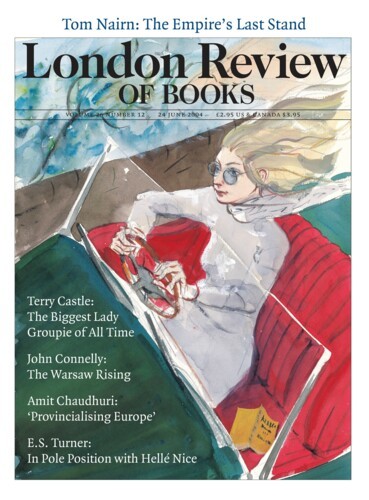Richard Wollheim’s memoir of his childhood, roughly a third of which appeared in two recent issues of the London Review (15 April and 20 May), is to be published in its entirety in September by the Waywiser Press. In his obituary of Wollheim in the Independent last November, John Richardson wrote that Germs – which Wollheim thought ‘the best piece of work’ he had ‘ever done’ – ‘must not be allowed to become a chef d’oeuvre inconnu’. Now it will not, though Waywiser is a very small publisher without the marketing or distribution clout of the many larger, mainstream firms – including the famously highbrow Faber – that turned Wollheim’s book down.
‘It’s hard enough to sell a memoir, let alone one by a dead man,’ one of them is alleged to have said, though Wollheim had no better luck when he showed the manuscript to publishers himself a few years ago. But whether or not something will sell shouldn’t be the only consideration. If there is a spectrum of reasons for publishing books, Being Jordan is at one end of it – cash – and Germs (not the most engaging title, admittedly) at the other: far more worth publishing for its own sake than most books that see their way into print. When a press gets it right, the moneyspinners subsidise the books that are worth publishing for other than commercial reasons. Many try to do this, but since the collapse of the Net Book Agreement, the end of the old Waterstone’s* and the rise in supermarket sales of books, it’s harder to find shelf space for the kinds of book that sell in only respectable quantities. And if a commissioning editor is finally answerable to an unsympathetic bean-counter in the City, the balance between commercial and literary considerations is increasingly difficult to maintain.
Nicholas Clee, the editor of the Bookseller, recently wrote in the Guardian that he ‘cannot condemn the hundreds of literary agents and publishers’ who turned down Gerard Jones’s ‘rather wonderful memoir’, Ginny Good (Monkfish, $16.95), because being ‘a gifted writer’ is a ‘hard quality to sell’. ‘There is also the matter of precedent . . . I’ve come across quite a few memoirists such as Jones, dismayed that publishers have failed to appreciate their work; none of them, before him, has had any talent. It’s difficult to prove yourself the exception.’ Spotting the exception, however, is what agents and publishers are meant to be good at.
‘Precedent’ is, anyway, a pretty unreliable indicator: while publishers play a game of catch-up, throwing bad money after good in the hope of finding the ‘new Harry Potter’ or the ‘new Zadie Smith’, the surprise next big thing – Fever Pitch, Bridget Jones’s Diary, Angela’s Ashes, Captain Corelli’s Mandolin, Longitude, Eats, Shoots and Leaves (none of them a great work of literature, sure, but the issue for the moment is what sells) – comes out of nowhere. Trusting one’s judgment is at least as good a way to proceed as trying to second-guess readers according to past performance – necessarily doomed if readers like things that strike them as new.
The habit of dousing untried writers in money doesn’t do anyone any favours. It makes sense that first books, especially first novels, receive relatively modest advances, and that the sums increase as the author establishes a growing readership with each successive book. But too often the reverse happens. The advances that some of the most likely looking first-time writers get today are pretty much guaranteed to lose the publisher money: indeed, there are agents who believe they’ve failed if a book earns out its advance. The first novel not having done as well as it was unreasonably expected to, the publisher is then reluctant to spend as generously, if at all, on the second. This is no way to ‘nurture talent’, one of the things publishers are supposed to do. It’s hard to believe that, not so many decades ago, Jonathan Cape, on receiving the manuscript of Norman Lewis’s fifth novel, wrote to Lewis thanking him and saying that the book was ‘very promising’. Not even first novels are touted as merely ‘promising’ these days, though that’s inevitably what most of them are, at best.
Penguin recently launched a dismal campaign to encourage young men to read more. The website, goodbooking.com, features an oiled model in a bikini, not so fresh from the cover of Nuts, and feverishly declares in bold orange and black letters: ‘Good looking women want good booking men.’ It’s almost as bad as those ads for pheromone sprays in the back of Viz; actually, it’s worse. One lucky reader of Nick Hornby’s 31 Songs this month will be given £1000 in cash by Penguin’s ‘stunning Good Booking Girl’. It’s not only grotesquely undignified, but a waste of time, effort and money that would be better directed towards publishing books worth publishing. As if. Meanwhile, be grateful that small presses like Waywiser still exist.
Send Letters To:
The Editor
London Review of Books,
28 Little Russell Street
London, WC1A 2HN
letters@lrb.co.uk
Please include name, address, and a telephone number.

